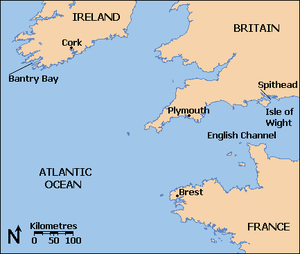| Action of 24 October 1793 | |||||||
|---|---|---|---|---|---|---|---|
| Part of the French Revolutionary Wars | |||||||
Map of the region, the approximate location of the action marked in red | |||||||
| |||||||
| Belligerents | |||||||
|
|
| ||||||
| Commanders and leaders | |||||||
|
|
| ||||||
| Strength | |||||||
|
4 frigates 1 brig | 1 frigate | ||||||
| Casualties and losses | |||||||
|
4 killed 7 wounded |
13 killed 21 wounded 1 frigate captured | ||||||
47°02′00″N 07°22′00″W / 47.03333°N 7.36667°W
The action of 24 October 1793 was a minor naval engagement during the first year of the French Revolutionary Wars. While cruising in the Northern Bay of Biscay, the British Royal Navy frigate HMS Thames, under Captain James Cotes, encountered the much larger French frigate Uranie, under Captain Jean-François Tartu. The ships engaged, with each suffering severe damage until they separated after nearly four hours of continual combat. Cotes ordered his crew to make hasty repairs, intending to resume the battle, but Uranie's crew, with their captain dead, slipped away while Thames was unable to manoeuvre. At 16:00, with repairs on Thames ongoing, a French squadron of three frigates and a brig, under Captain Zacharie Allemand, arrived, firing on Thames as they approached. Outnumbered, Cotes surrendered his ship to Allemand, who commended Cotes on his resistance to the far larger Uranie.
The French brought Thames into Brest, where sailors from Allemand's squadron looted the frigate. The British officers were imprisoned for the next two years. The frigate was commissioned into the French Navy as Tamise, and Uranie was renamed Tartu in honour of her deceased captain. Both vessels then served with the French Atlantic Fleet, Tamise until 8 June 1796, when the British recaptured her off the Scilly Isles, and Tartu until 30 December 1796 when the British captured her during the Expédition d'Irlande.
